BLACKPOOL F.C.
Founded: 1887
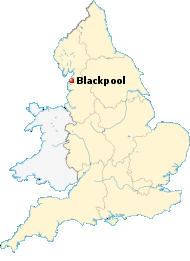
CLICK ON THE MAP TO
VIEW ENLARGED MAP
|
BLACKPOOL F.C. (Football Club)
Included Info: Brief History, Club/Stadium Info, Team Jersey & Much More...
BRIEF HISTORY of BLACKPOOL FOOTBALL CLUB
(reproduced from 'Wikipedia' pages)
Football had developed in Blackpool by 1877 when Victoria F.C. were founded as a church club with a ground
in Caunce Street. This team disbanded a few years later but some of its members are understood to have merged
with old boys from St John's School to form a new club called Blackpool St John's. But the two factions remained
disunited and, on 26 July 1887, at a meeting in the Stanley Arms public house, the members resolved to wind up
St John's and form a new club to represent the whole town called Blackpool Football Club. At the conclusion of
the following 1888–89 season, Blackpool became founder members of the Lancashire League. In their first season
in the competition, the club finished fifth out of the thirteen member clubs. They finished as runners-up over
the following three seasons (to Bury twice and Liverpool once), before winning the championship themselves on
their fourth attempt. Blackpool's home at that point in time was Raikes Hall (also known as the Royal Palace
Gardens), which was part of a large entertainment complex that included a theatre and a boating lake, amongst
other attractions. After struggling to repeat the success of the 1893–94 season, the Blackpool board decided
it was time to leave local football behind, so on 13 May 1896 the club became a limited company and applied
for entry to the Football League. Their application was successful, and for the club's debut season, 1896–97,
they joined the sixteen-team Second Division. Blackpool's first-ever Football League game took place on 5
September 1896, at Lincoln City, which they lost 3–1 in front of around 1,500 spectators.
During the 1928–29 campaign and with Jimmy Hampson's 40 goals, the club finished eighth. In the next season,
Evans guided Blackpool to the Division Two championship (their only championship to date), finishing three points
ahead of Chelsea. Hampson had bagged 45 of the club's 98 League goals. Blackpool lasted only three seasons in
the First Division. Two third-bottom finishes were followed by a last-placed finish, and the club returned to
the Second Division. The club's relegation prompted the Blackpool board to install a recognised manager, and they
opted for Sandy MacFarlane. MacFarlane occupied the Bloomfield Road hot seat for just two seasons, in which the
club finished eleventh and fourth. MacFarlane's final season, 1934–35, marked Jimmy Hampson's eighth successive
(and final) season as Blackpool's top League goalscorer. Joe Smith was appointed Blackpool's sixth manager in
August 1935, a role in which he remained for the next 23 years. The club finished tenth in Smith's first season,
with Bobby Finan taking over from Hampson as top scorer, with 34 goals. It was Smith's second season in charge,
however, that marked the starting point of the success to come. Blackpool finished the 1936–37 season as
runners-up in the Second Division to Leicester City and were promoted back to the First Division. Two seasons
of Division One football were played before a Second World War intervened. Blackpool sat atop the table at the
time the abandonment occurred. Regional competitions were implemented again between 1939 and 1945.
Post-war Blackpool reached the FA Cup Final on three occasions, losing to Manchester United in 1948 and
Newcastle United three years later, and winning it in 1953 captained by Harry Johnston. In 1955–56, and now
captained by Kelly, Blackpool attained their highest-ever League finish: runners-up to Manchester United,
despite losing their final four League games. It was a feat that could not be matched or bettered over the
following two seasons, with fourth and seventh-placed finishes, and Smith left Blackpool as the club's most
successful and longest-serving manager. The League Cup came into existence in 1960–61. Blackpool were knocked
out in the second round, the round in which they entered. The club's First Division status came under threat,
but they managed to avoid relegation by one point, at the expense of Newcastle United. Local arch-rivals
Preston North End were the other club to make the drop. On 12 June 1971, well over a month after the conclusion
of the League season, Blackpool won the Anglo-Italian Cup with a 2–1 victory over Bologna in the final. This
was achieved without the services of Jimmy Armfield, who retired in May after seventeen years and 627 appearances
for the club. Blackpool finished amongst the top ten teams in the Second Division for six consecutive seasons,
under three different managers: Stokoe, Harry Potts and Allan Brown. Twice Blackpool narrowly missed promotion
to Division One, by two points in 1974 and one point in 1977. In February 1978, midway through 1977–78, Brown's
second season at the helm, Blackpool were seventh in the division. Having just beaten local rivals Blackburn
Rovers 5–2, Brown was sacked by chairman Billy Cartmell for personal reasons. The team won only one more game
that season, which ended with their relegation to the Division Three for the first time in their history.
In the 1991–92 season, Blackpool finished in fourth place, missing out on automatic promotion by one point,
which meant another play-offs experience. This time they met Barnet in the semi-finals and won 2–1 on aggregate.
They returned to Wembley, where they faced Scunthorpe United in the final, the team they knocked out of the
play-offs twelve months earlier. Again the score was tied at the end of regular and extra time, but Blackpool
were victorious in the penalty shootout and booked their place in the new Division Two (third tier).
Blackpool struggled in their first term back in the third tier of English football but pulled to safety in
eighteenth place by the end. In late 1993 they were as high as fourth but tumbled down the table in the second
half of that season to miss the drop by a whisker in twentieth, avoiding relegation by virtue of a 4–1 victory
over Leyton Orient on the final day of the season.[9] Ayre was sacked in the summer of 1994 and was replaced
by Sam Allardyce. Allardyce led Blackpool to a mid-table finish in his first season and saw the club knocked
out of both cup competitions at the first hurdle. Tony Ellis was the club's top scorer with seventeen League goals.
The 1995–96 season saw Blackpool finish third and claim a place in the play-offs for the third time in six seasons.
In the semi-finals, Blackpool travelled to Bradford City and won 2–0. Three days later, they hosted the
Yorkshiremen at Bloomfield Road and lost 3–0. Blackpool remained in Division Two, and Allardyce was sacked not
long afterwards. In the 2006–07 FA Cup Blackpool reached the fourth round for the first time in seventeen years,
after beating Aldershot Town 4–2 at Bloomfield Road, but were knocked out by Norwich City, 3–2 after a replay
at Carrow Road.
Blackpool finished the 2009–10 regular season in sixth place in The Championship, their highest finish in the
Football League since 1970–71, and claimed a spot in the play-offs. On 2 May 2010, the 57th anniversary of
Blackpool's FA Cup Final victory, Blackpool hosted Bristol City for the final League game of the season.
They needed to match or better Swansea City's result in their match at home to Doncaster Rovers. Both matches
ended in draws, with Swansea's Lee Trundle having a late goal disallowed for handball, which meant Blackpool
secured the remaining play-off place. On 8 May, Blackpool beat Nottingham Forest 2–1 at Bloomfield Road in the
semi-final first leg.[24] Three days later, they beat them 4–3 (6–4 on aggregate) at the City Ground in the
second leg to progress to the final (their third in ten seasons) against Cardiff. The result meant Blackpool
had beaten Forest in all four of the clubs' meetings in 2009–10. Blackpool defeated Cardiff City 3–2 on 22
May in the Championship play-off Final at Wembley Stadium to earn promotion to the Premier League. It was
Blackpool's debut appearance in the Premier League in its 18-year existence and their first appearance in
English football's top flight in 39 years.
|
CLUB FACTS & INFORMATION
| Official Name
| --
| Blackpool F.C. |
| Club Nickname
| --
| The Seasiders |
| Year Founded
| --
| 1887 (130 years ago) |
| English County
| --
| Lancashire |
| Current Ground
| --
| Bloomfield Road |
| Ground Location
| --
| Blackpool, England |
| Club's Owners
| --
| Owen Oyston, Valeri Belokon |
| Club Chairman
| --
| Karl Oyston |
| Current Manager
| --
| Gary Bowyer |
| Current League
| --
| League One |
| Last Season
| --
| League Two, 7th place
(promoted via play-offs) |
HOME COLORS

Tangerine & White |
AWAY COLORS

Black w/Tangerine Trim |
|
| |
INTERESTING STADIUM FACTS & INFORMATION

BLOOMFIELD ROAD
Seasiders Way, Blackpool
Lancashire, FY1-6JJ England
OPENED: ......... October 28, 1899
SURFACE: ........ Grass
COST: .............. not avaliable
CAPACITY: ...... 17,338
RECORD: ......... 38,098 (1955 vs Wolverhampton)
OWNER: ........... Segesta Ltd.
OPERATOR: ..... Blackpool F.C.
FIELD SIZE: ..... 112 x 74 yards (102 x 68 meters)
|
|
|
HOME JERSEY
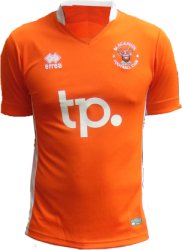 |
AWAY JERSEY
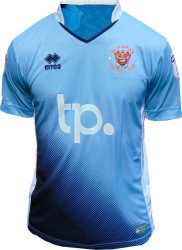 |
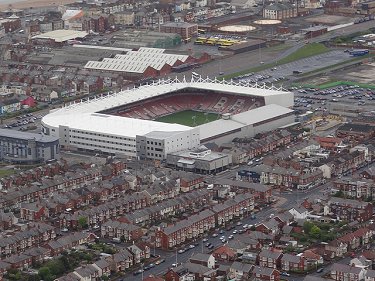
Click On Aerial Photo To View/Download Enlarged Image
|
Bloomfield Road (Blackpool) Seating Diagram
Click On Diagram Below To Enlarge View
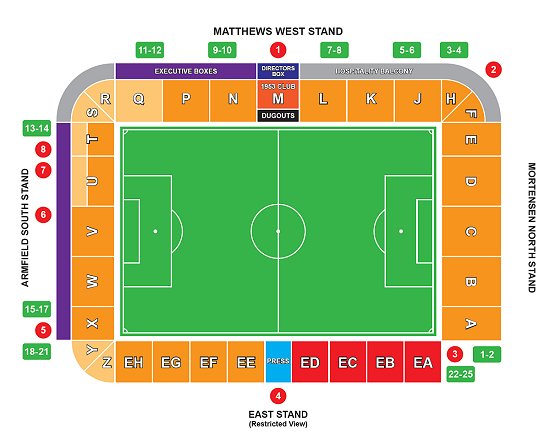
|



BLACKPOOL STADIUM WALLPAPERS (Free Download)
Wallpaper Size below is 800x600: To Download Bigger Sizes, Click On Any Button Shown Above
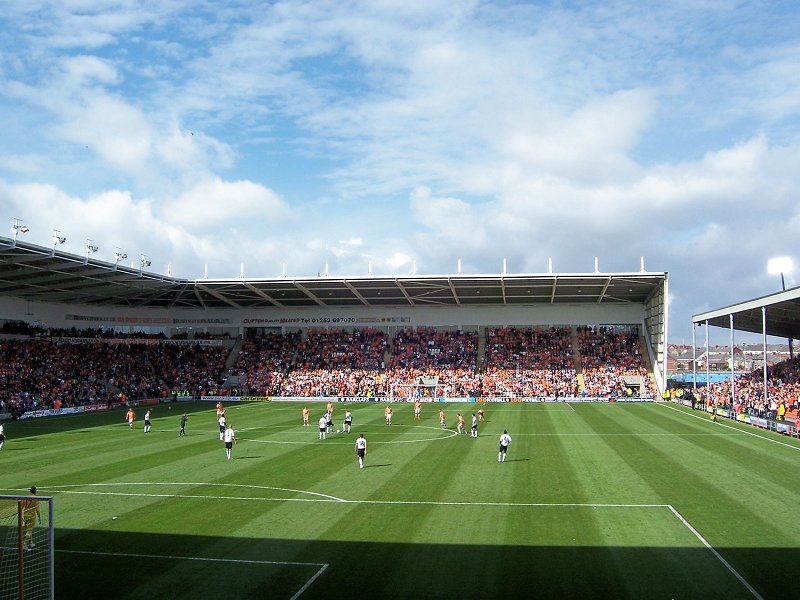
|
|

